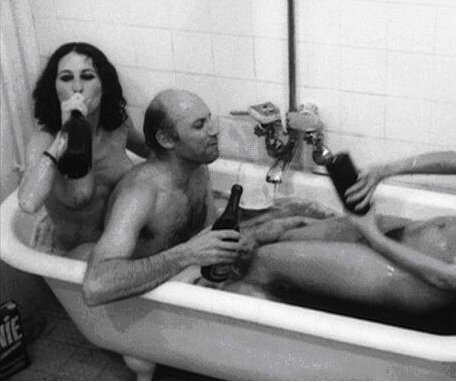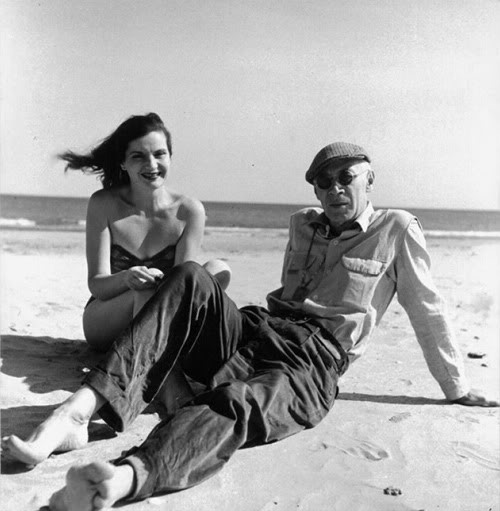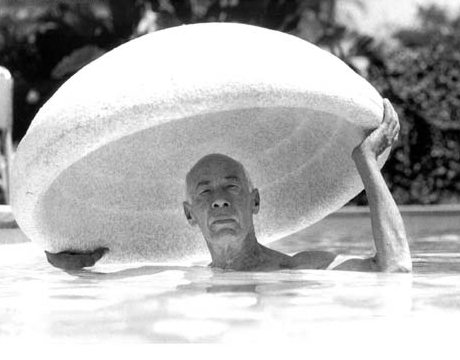A piece of Henry Miller’s final interview, shortly before his death in 1980.
People aren’t so drawn to Miller because they agree with everything he wrote or did, but because he refused to accept the things handed him that made him unhappy in a time when it was very difficult to say “no.” That’s best expressed in the opening of The Tropic of Capricorn:
“Once you have given up the ghost, everything follows with dead certainty, even in the midst of chaos. From the beginning it was never anything but chaos: it was a fluid which enveloped me, which I breathed in through the gills. In the substrata, where the moon shone steady and opaque, it was smooth and fecundating; above it was a jangle and a discord. In everything I quickly saw the opposite, the contradiction, and between the real and the unreal the irony, the paradox. I was my own worst enemy. There was nothing I wished to do which I could just as well not do. Even as a child, when I lacked for nothing, I wanted to die: I wanted to surrender because I saw no sense in struggling. I felt that nothing would be proved, substantiated, added or subtracted by continuing an existence which I had not asked for. Everybody around me was a failure, or if not a failure, ridiculous. Especially the successful ones. The successful ones bored me to tears. I was sympathetic to a fault, but it was not sympathy that made me so. It was purely negative quality, a weakness which blossomed at the mere sight of human misery. I never helped anyone expecting that it would do me any good; I helped because I was helpless to do otherwise. To want to change the condition of affairs seemed futile to me; nothing would be altered, I was convinced, except by a change of heart, and who could change the hearts of men? Now and then a friend was converted: it was something to make me puke. I had no more need of God than He had of me, and if there were one, I often said to myself, I would meet Him calmly and spit in His face.
What was most annoying was that at first blush people usually took me to be good, to be kind, generous, loyal, faithful. Perhaps I did possess these virtues, but if so it was because I was indifferent: I could afford to be good, kind, generous, loyal, and so forth, since I was free of envy. Envy was the one thing I was never a victim of. I have never envied anybody or anything. On the contrary, I have only felt pity for everybody and everything.
From the very beginning I must have trained myself not to want anything too badly. From the very beginning I was independent, in a false way. I had need of nobody because I wanted to be free, free to do and to give only as my whims dictated. The moment anything was expected or demanded of me I balked. That was the form my independence took. I was corrupt, in other words, corrupt from the start. It’s as though my mother fed me a poison, and though I was weaned young the poison never left my system. Even when she weaned me it seemed that I was completely indifferent; most children rebel, or make a pretence of rebelling, but I didn’t give a damn. I was a philosopher when still in swaddling clothes. I was against life, on principle. What principle? The principle of futility. Everybody around me was struggling. I myself never made an effort. If I appeared to be making an effort it was only to please someone else; at bottom I didn’t give a rap. And if you can tell me why this should have been so I will deny it, because I was born with a cussed streak in me and nothing can eliminate it. I heard later, when I had grown up, that they had a hell of a time bringing me out of the womb. I can understand that perfectly. Why budge? Why come out of a nice warm place, a cosy retreat in which everything is offered you gratis? The earliest remembrance I have is of the cold, the snow and ice in the gutter, the frost on the window panes, the chill of the sweaty green walls in the kitchen. Why do people live in outlandish climates in the temperate zones, as they are miscalled? Because people are naturally idiots, naturally sluggards, naturally cowards. Until I was about ten years old I never realized that there were “warm” countries, places where you didn’t have to sweat for a living, nor shiver and pretend that it was tonic and exhilarating. Wherever there is cold there are people who work themselves to the bone and when they produce young they preach to the young the gospel of work – which is nothing, at bottom, but the doctrine of inertia. My people were entirely Nordic, which is to say idiots. Every wrong idea which has ever been expounded was theirs. Among them was the doctrine of cleanliness, to say nothing of righteousness. They were painfully clean. But inwardly they stank. Never once had they opened the door which leads to the soul; never once did they dream of taking a blind leap into the dark. After dinner the dishes were promptly washed and put in the closet; after the paper was read it was neatly folded and laid away on a shelf; after the clothes were washed they were ironed and folded and then tucked away in the drawers. Everything was for tomorrow, but tomorrow never came. The present was only a bridge and on this bridge they are still groaning, as the world groans, and not one idiot ever thinks of blowing up the bridge.”
Tags: Henry Miller



